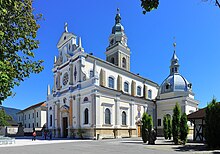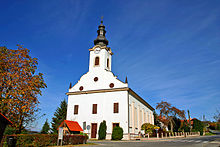Religion in Slovenia
Other Christian groups having significant followings in the country include Eastern Orthodoxy and Protestantism (Lutheranism).[citation needed] After a centuries-long tradition of a state church, interrupted by the periods of Protestant Reformation (in the 16th century) and post–World War II socialism (which ousted religion from the public life), a degree of separation of the state and the church has been reached in independent Slovenia.[4] Eastern Orthodoxy maintains a significant presence in the country and is practised in majority by Slovenians of Serbian heritage.[11] A 2010 Eurobarometer poll found that 26% of the population of Slovenia stated that "I don't believe there is any sort of spirit, God or life force".Religious groups may easily register with the government in order to receive some privileges, largely consisting of various forms of monetary compensation.Slovenia's laws prohibit circumcision for non-medical reasons and animal slaughtering practices that are necessary for meat to be considered kosher or halal.
Roman CatholicismSerbian OrthodoxyProtestantismSlovenesDiasporaArgentinaAustraliaAustriaCanadaCroatiaHungaryUnited StatesVenezuelaCulture of SloveniaLiteratureCinemaCuisineSlovenePrekmurje SloveneResianHistory of SloveniaBrezjeCatholicLutheranBodonciSts. Cyril and Methodius Serbian Orthodox ChurchMetropolitanate of Zagreb and LjubljanaChristianityCatholic ChurchChristian denominationEastern OrthodoxyLutheranismJudaismHinduismSlovenia Slovenian nationstate churchProtestant ReformationsocialismCatholic Church in SloveniadiocesesarchdiocesesMariborBenedict XVINovo MestoMurska SobotaReformationPrimož TrubarSlovenian languageSlovenian cultureCalvinismHabsburgsCounter-ReformationCalvinistHungariansPrekmurjeSerbianIslam in SloveniaMuslimsBosniaksethnic MuslimsSlovenian MuslimsHistory of the Jews in SloveniaJewishLjubljanaEuropeanHinduism in SloveniaInternational Society for Krishna ConsciousnessEurobarometerInternational Social Survey ProgrammeFreedom of religion in SloveniakosherDemographics of SloveniaCOBISSpublic domainHistoryTimelineNoricumPannoniaSlavic settlement of the Eastern AlpsSamo's RealmCarantaniaMarch of CarniolaHungarian MarchWindic MarchIllyrian ProvincesKingdom of IllyriaDuchy of CarniolaDrava BanovinaSocialist RepublicGeographyAdriatic SeaCities and townsConservationIslandsMountainsMunicipalitiesRiversWorld Heritage SitesPoliticsConstitutionElectionsForeign relationsGovernmentJudiciaryLGBT rightsMilitaryParliamentPolicePolitical partiesPresidentStatistical regionsEconomyCentral bankEnergyStock exchangeTelecommunicationsTourismTransportDrivingHighwaysRail transportDemographicsEducationHealthcareLanguages


